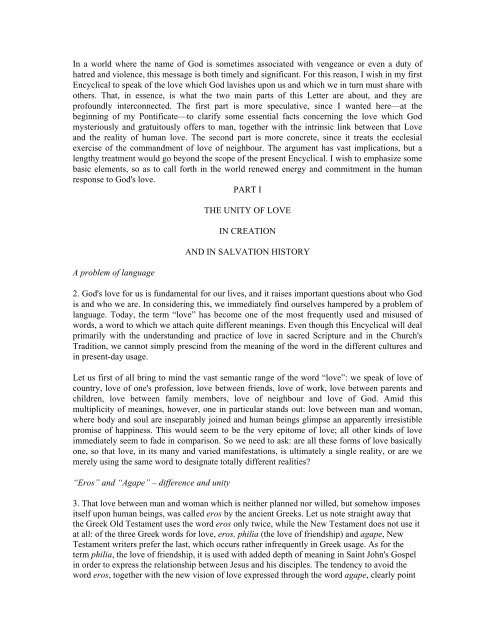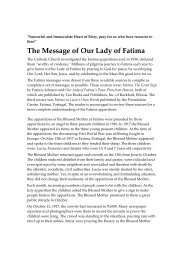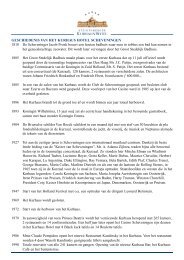God Is Love - Beeldbibliotheek
God Is Love - Beeldbibliotheek
God Is Love - Beeldbibliotheek
- No tags were found...
Create successful ePaper yourself
Turn your PDF publications into a flip-book with our unique Google optimized e-Paper software.
In a world where the name of <strong>God</strong> is sometimes associated with vengeance or even a duty ofhatred and violence, this message is both timely and significant. For this reason, I wish in my firstEncyclical to speak of the love which <strong>God</strong> lavishes upon us and which we in turn must share withothers. That, in essence, is what the two main parts of this Letter are about, and they areprofoundly interconnected. The first part is more speculative, since I wanted here—at thebeginning of my Pontificate—to clarify some essential facts concerning the love which <strong>God</strong>mysteriously and gratuitously offers to man, together with the intrinsic link between that <strong>Love</strong>and the reality of human love. The second part is more concrete, since it treats the ecclesialexercise of the commandment of love of neighbour. The argument has vast implications, but alengthy treatment would go beyond the scope of the present Encyclical. I wish to emphasize somebasic elements, so as to call forth in the world renewed energy and commitment in the humanresponse to <strong>God</strong>'s love.PART IA problem of languageTHE UNITY OF LOVEIN CREATIONAND IN SALVATION HISTORY2. <strong>God</strong>'s love for us is fundamental for our lives, and it raises important questions about who <strong>God</strong>is and who we are. In considering this, we immediately find ourselves hampered by a problem oflanguage. Today, the term “love” has become one of the most frequently used and misused ofwords, a word to which we attach quite different meanings. Even though this Encyclical will dealprimarily with the understanding and practice of love in sacred Scripture and in the Church'sTradition, we cannot simply prescind from the meaning of the word in the different cultures andin present-day usage.Let us first of all bring to mind the vast semantic range of the word “love”: we speak of love ofcountry, love of one's profession, love between friends, love of work, love between parents andchildren, love between family members, love of neighbour and love of <strong>God</strong>. Amid thismultiplicity of meanings, however, one in particular stands out: love between man and woman,where body and soul are inseparably joined and human beings glimpse an apparently irresistiblepromise of happiness. This would seem to be the very epitome of love; all other kinds of loveimmediately seem to fade in comparison. So we need to ask: are all these forms of love basicallyone, so that love, in its many and varied manifestations, is ultimately a single reality, or are wemerely using the same word to designate totally different realities?“Eros” and “Agape” – difference and unity3. That love between man and woman which is neither planned nor willed, but somehow imposesitself upon human beings, was called eros by the ancient Greeks. Let us note straight away thatthe Greek Old Testament uses the word eros only twice, while the New Testament does not use itat all: of the three Greek words for love, eros, philia (the love of friendship) and agape, NewTestament writers prefer the last, which occurs rather infrequently in Greek usage. As for theterm philia, the love of friendship, it is used with added depth of meaning in Saint John's Gospelin order to express the relationship between Jesus and his disciples. The tendency to avoid theword eros, together with the new vision of love expressed through the word agape, clearly point












